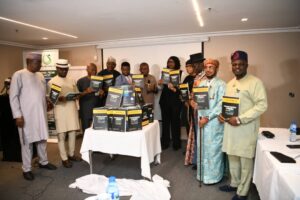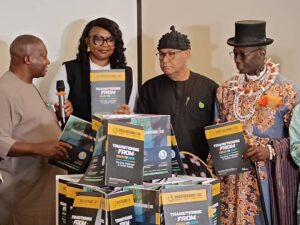The unveiling of Spaces for Change|S4C’s latest report titled, “Transitioning From GMOU to HCDT: The Wins, Challenges & Further Actions”, on February 28, brought together representatives of oil-producing communities, indigenous and international oil companies, regulators in the upstream, midstream and downstream sectors, federal lawmakers, civil society organizations, academia, and the media. The report examined the extent petroleum companies operating in Nigeria are fulfilling their legal obligation to deliver social and economic benefits to communities in the oil-producing areas through the new legal arrangement called the ‘Host Community Development Trusts (HCDT)?’ The HCDT, mandated by Chapter 3 of the Petroleum Industry Act (PIA) 2021, replaces the previous benefit-sharing mechanism called the Global Memorandum of Understanding (GMOU) wherein oil and gas companies executed benevolent, or sometimes, negotiated agreements with their host communities, committing to carry out certain community development projects in their areas of operation.
At the two-day Technical Session of the Nigerian House of Representatives’ Committee on Host Communities facilitated by S4C on November 28-29, 2023, stakeholders in the oil and gas sector converged in the Niger Delta to evaluate the status of implementation of the HCDTs by petroleum companies. With a focus on the critical role of the HCDT in promoting sustainable prosperity and peaceful co-existence between oil companies and host communities, this report chronicles the proceedings at the Technical Session, highlighting the wins and challenges associated with HCDT implementation, the emerging good and bad practices, as well as the disparate experiences and modalities established by petroleum corporations for transitioning from GMOU to HCDT.
Among other things, the report found that some petroleum companies—like Shell Petroleum Development Company (SPDC), Chevron Nigeria Limited (CNL), and Seplat Petroleum Development Company (SEPLAT)—have not only begun to incorporate the Host Community Trusts as required by law, but are also leveraging the pre-existing community engagement structures instituted during the GMOU era to accelerate the implementation of the HCDTs. The report further identified a number of good practices trailing HCDT implementation across the Niger Delta. For instance, the Nigerian Upstream Petroleum Regulatory Commission (NUPRC) has developed a database with the complete list of upstream companies that have set up the HCDTs in their host communities. The database is available for viewing by interested persons. Other good practices include NUPRC’s introduction of an automated platform for reporting and monitoring the HCDT; the creation of Alternative Dispute Resolution (ADR) offices in Lagos and Yenogoa, Bayelsa State; the formulation and gazetting of the Host Communities’ Development Regulations, 2022, and so on.
On the other hand, there are bad practices and contentious issues to watch out for. Top on that list is the high volume of litigation and protests across oil producing communities; power asymmetry between petroleum corporations and their host communities; lack of due process and transparency in the nomination of community representatives serving on the governing bodies of the HCDTs; reprisals targeted at community members speaking up or exposing deficiencies in the HDCTs; inflexibility of oil companies and resistance to innovation; gender imbalance and tokenism; lack of independent monitoring of HCDT implementation; companies reluctance to disclose how 3% operating expenditure (Opex) is calculated; divestments without environmental accountability, among others.
Executives of the Nigerian Upstream Regulatory Commission (NUPRC and the Nigerian Midstream and Downstream Petroleum Regulatory Authority (NMDPRA) commended S4C’s sustained advocacy to ensure that the benefits of natural resources, indeed, trickle down to local populations who bear the brunt of mineral resource extraction. Various stakeholders, especially the civil society and traditional rulers of oil-producing communities, supported S4C’s call on the National Assembly to expunge Section 257(2) of the PIA, 2021, relieving host communities of the liabilities associated with the vandalism of petroleum installations.
The Chairman of the House of Representatives Committee on Host Communities, Honorable Dumnameme Dekor, seized the opportunity to unveil the Committee’s Strategic Plan 2023-2027. This plan sets out the strategies the Committee intends to take toward ensuring the effective implementation of the provisions of the PIA 2021 related to the development and well-being of host communities. The Chairman also called for collaborations with diverse stakeholders to advance the common goal of equitable benefit-sharing and well-being in host communities, with emphasis placed on adequate regulatory oversight.
At the end of the event, stakeholders expressed appreciation for the timely report and the renewed hope for the resolution of longstanding hostilities in oil-bearing communities. Traditional rulers urged lawmakers and industry regulators to implement the recommendations outlined in the report, which, among
others, include the provision for adequate funding for the Nigerian Midstream and Downstream Petroleum Regulatory Authority (NMDPRA) to effectively
perform its regulatory function in fostering the development of host communities, and the repeal of Section 257(2) of the PIA, 2021.






















